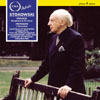Stokowski - A French Concert
The eternally youthful Stokowski was still making recordings in his nineties - with no loss of vigour - as these recordings attest
View record and artist detailsRecord and Artist Details
Composer or Director: Maurice Ravel, César Franck, Fryderyk Chopin, Olivier Messiaen, (Marie Eugène) Henri Duparc
Label: Cala
Magazine Review Date: 1/2000
Media Format: CD or Download
Media Runtime: 74
Mastering:
ADD
Catalogue Number: CACD0525

Tracks:
| Composition | Artist Credit |
|---|---|
| Symphony |
César Franck, Composer
César Franck, Composer Hilversum Radio Philharmonic Orchestra Leopold Stokowski, Conductor |
| (L') Ascension |
Olivier Messiaen, Composer
Leopold Stokowski, Conductor London Symphony Orchestra Olivier Messiaen, Composer |
| Mazurkas (Complete), Movement: No. 13 in A minor, Op. 17/4 (1832-33) |
Fryderyk Chopin, Composer
Fryderyk Chopin, Composer Leopold Stokowski, Conductor London Symphony Orchestra |
| Extase |
(Marie Eugène) Henri Duparc, Composer
(Marie Eugène) Henri Duparc, Composer Leopold Stokowski, Conductor London Symphony Orchestra |
| Fanfare pour 'L'éventail de Jeanne' |
Maurice Ravel, Composer
Hilversum Radio Philharmonic Orchestra Leopold Stokowski, Conductor Maurice Ravel, Composer |
Author: jswain
Recordings made as Stokowski approached and arrived at a hale-and-hearty 90, with the conjuror-conductor's powers shining as brightly as ever. The word 'evocative' hardly seems adequate for the orientally inclined impressionist hazes and haunted spaces of Stokowski's own Chopin Mazurka transcription - a lament for a Mazurka perhaps? Neither will the expression 'heartfelt' do for the way the LSO strings emote in 'Prayer of Christ ascending to the Father' which ends Messiaen's L'ascension - no mere meditation, but an imploration to rival Barber's Adagio in intensity. When not caught up in this vividly communicative music-making, you may stop to notice (but hopefully not to worry) that its very vividness is engineer-assisted. I found myself much more absorbed by Stokowski's way with these pieces - and the superlative playing of a totally committed LSO - than distracted by the more entertaining quirks of the original Decca Phase Four balances ('ping-pong' stereo, instrumental spotlighting and periodical injudicious lashings of reverberation). For example, it hadn't occurred to me before just how indebted the young Messiaen was to Roussel in L'ascension's joyous third-movement Alleluias and fugue.
Stokowski obviously saw the Franck Symphony as a turbulent piece, the Lento introduction - swift, determinedly unmonumental and charged with all manner of tempo and dynamic variations - being a true indicator of things to come. Sadly, the so-called Hilversum orchestra (real name: the Netherlands Radio Philharmonic) is not in the LSO league. And, possibly as a result, the extremity of the moulding of tempo and phrasing often has the feeling of manhandling - of the orchestra, and of Franck's score. Equally, the recording is less distinguished, with fortissimos more noticeably flattened out, and an occasionally murky view of the inner workings. Suffice it to say that two other equally vital octogenarians - Monteux and Beecham (EMI, 9/92 - nla) - left us accounts of the Symphony with a greater yield of its secrets, its shape and its purpose.
None the less, as a demonstration of a more than normally volatile Franck, it is likely to compel as often as it repels. And it is also worth hearing for Stokowski's way with the brass - the tuba often tolling away like a warning of stormy weather, the 'hot' upper brass nearly always tamed for maximum euphony in tuttis, and, at one point in the finale (one bar before fig. O, from 8'22'') the horns popping up with a little canonic imitation of the strings. As to that last example, Franck would surely have nodded approval with the words 'now, why didn't I think of that?'.'
Stokowski obviously saw the Franck Symphony as a turbulent piece, the Lento introduction - swift, determinedly unmonumental and charged with all manner of tempo and dynamic variations - being a true indicator of things to come. Sadly, the so-called Hilversum orchestra (real name: the Netherlands Radio Philharmonic) is not in the LSO league. And, possibly as a result, the extremity of the moulding of tempo and phrasing often has the feeling of manhandling - of the orchestra, and of Franck's score. Equally, the recording is less distinguished, with fortissimos more noticeably flattened out, and an occasionally murky view of the inner workings. Suffice it to say that two other equally vital octogenarians - Monteux and Beecham (EMI, 9/92 - nla) - left us accounts of the Symphony with a greater yield of its secrets, its shape and its purpose.
None the less, as a demonstration of a more than normally volatile Franck, it is likely to compel as often as it repels. And it is also worth hearing for Stokowski's way with the brass - the tuba often tolling away like a warning of stormy weather, the 'hot' upper brass nearly always tamed for maximum euphony in tuttis, and, at one point in the finale (one bar before fig. O, from 8'22'') the horns popping up with a little canonic imitation of the strings. As to that last example, Franck would surely have nodded approval with the words 'now, why didn't I think of that?'.'
Discover the world's largest classical music catalogue with Presto Music.

Gramophone Digital Club
- Digital Edition
- Digital Archive
- Reviews Database
- Full website access
From £8.75 / month
Subscribe
Gramophone Full Club
- Print Edition
- Digital Edition
- Digital Archive
- Reviews Database
- Full website access
From £11.00 / month
Subscribe
If you are a library, university or other organisation that would be interested in an institutional subscription to Gramophone please click here for further information.




